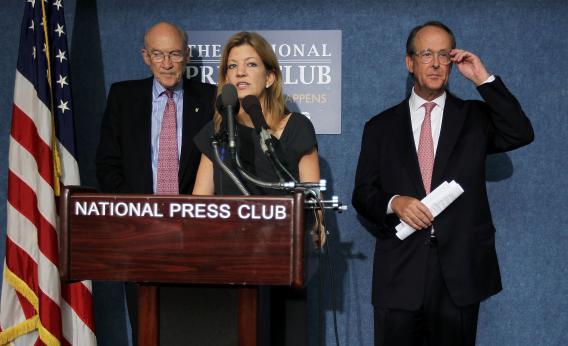Maya MacGuineas got a master’s degree from the Kennedy School of Government in 1997 and ever since then has been working as a professional deficit hawk, first at the Concord Coalition then later at the Committee for a Responsible Federal Budget and now at Fix the Debt. During that 15 year career as a professional deficit hawk, it’s never been the case that high budget deficits are the cause of any problems in the United States. So what’s driven her to this work?
Well according to Suzy Khimm’s profile it all goes back to the early ‘90s when she was an equity analyst at Paine Webber:
On Wall Street, she became fascinated with Clinton-era “bond vigilantes” who warned that traders would force borrowing costs higher if the United States didn’t reduce its budget deficit. She came away with a sense of foreboding.
We are often shaped by our formative years, and clearly the alleged bond vigilantism of the first half of the 1990s made a strong impression on many people who were around at that point. But in life one should try to be open-minded about such things, and I would say that the experience of the past 12 years should cast some serious doubt on the bond vigilantes theory of the world. And it’s not a partisan point. Recall that during the first five years of George W. Bush’s administration, the United States racked up an enormous deficit overwhelmingly caused by tax cuts and wars that liberals didn’t approve of. Since liberals thought these were bad policies, liberals also really wanted to believe that there would be a kind of comprehensive reckoning for the sheer irresponsibility of the borrowing. Said liberals spent a fair amount of time waiting for the attack of the bond vigilantes that they knew would be Bush’s comeuppance. But it never happened, and then along came the 2008 election and conservatives began waiting for the bond vigilantes. But they didn’t arrive in 2009 or 2010 or 2011 or 2012 either.
So now at the end of the year we find ourselves facing the “fiscal cliff,” a politics-driven crisis of excessive short-term austerity whose existence has been deliberately engineered by deficit hawks because the bond vigilantes never seem to show up in time.
You can imagine a kind of cult in the ancient Middle East in which the villagers are expected to make regular sacrifices to the gods in order to stave off their wrath. Well one year the proper sacrifices aren’t made and yet no suffering seems to be imminent. The priestly caste now has a problem, since their livelihoods depend on the perpetuation of the cult. So they sneak out of the temple at night, burn a bunch of crops, and the next morning warn that even worse is to come if the sacrifices aren’t renewed. Not because the priests are bad people, mind you, they very sincerely believe that the gods are just lying in wait to destroy the village so they’re actually doing everyone a favor.
But what if there are no gods? No bond vigilantes? What if there’s only inflation dynamics? Perhaps the issue in the early 1990s wasn’t about budget confidence at all. High interest rates were driven by the central bank’s desire to constrain aggregate demand and reduce inflation. Tighter fiscal policy under circumstances of robust demand led to offsetting lower interest rates and more investment. But inflation pressures have been nil for the past 12 years, first because of the enormous increase in Chinese production capacity and then because of the extended hangover of the financial crisis. Rates will rise if and when growth returns, but not previously and not for any reason that’s particularly related to what long-term CBO scores say.
